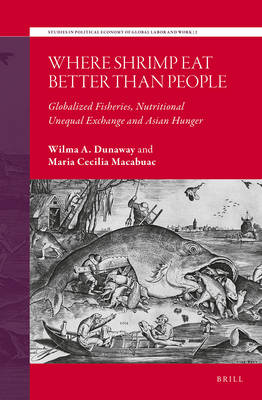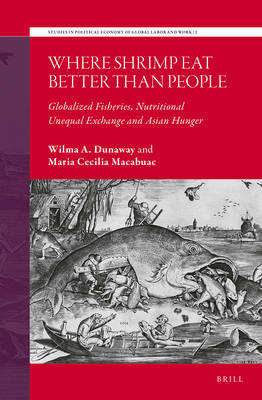
- Afhalen na 1 uur in een winkel met voorraad
- Gratis thuislevering in België vanaf € 30
- Ruim aanbod met 7 miljoen producten
- Afhalen na 1 uur in een winkel met voorraad
- Gratis thuislevering in België vanaf € 30
- Ruim aanbod met 7 miljoen producten
Where Shrimp Eat Better Than People
Globalized Fisheries, Nutritional Unequal Exchange and Asian Hunger
Wilma Dunaway, Maria Cecilia Macabuac
€ 172,45
+ 344 punten
Omschrijving
East, South and Southeast Asia are home to two-thirds of the world's hungry people, but they produce more than three-quarters of the world's fish and nearly half of other foods. Through integration into the world food system, these Asian fisheries export their most nutritious foods and import less healthy substitutes. Worldwide, their exports sell cheap because women, the hungriest Asians, provide unpaid subsidies to production processes. In the 21st century, Asian peasants produce more than 60 percent of the regional food supply, but their survival is threatened by hunger, public depeasantization policies, climate change, land grabbing, urbanization and debt bondage.
*Where Shrimp Eat Better than People: Globalized Fisheries, Nutritional Unequal Exchange and Asian Hunger is now available in paperback for individual customers.
*Where Shrimp Eat Better than People: Globalized Fisheries, Nutritional Unequal Exchange and Asian Hunger is now available in paperback for individual customers.
Specificaties
Betrokkenen
- Auteur(s):
- Uitgeverij:
Inhoud
- Aantal bladzijden:
- 464
- Taal:
- Engels
- Reeks:
- Reeksnummer:
- nr. 2
Eigenschappen
- Productcode (EAN):
- 9789004522640
- Verschijningsdatum:
- 12/01/2023
- Uitvoering:
- Hardcover
- Formaat:
- Genaaid
- Afmetingen:
- 155 mm x 235 mm
- Gewicht:
- 896 g

Alleen bij Standaard Boekhandel
+ 344 punten op je klantenkaart van Standaard Boekhandel
Beoordelingen
We publiceren alleen reviews die voldoen aan de voorwaarden voor reviews. Bekijk onze voorwaarden voor reviews.










